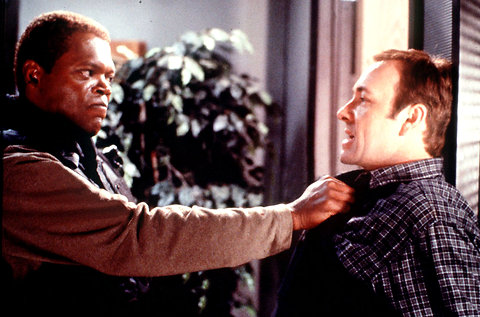
Negotiating with Samuel L. Jackson’s is no picnic.
Dear Holly,
I own a small construction company here in Brooklyn. I often sub contract services so I’m constantly negotiating and managing contracts.
I can honestly say that I hate to negotiate, and that it’s probably the most challenging part of my job.
Do you have any advice on how I can become a better negotiator? I know that this piece of running my business is not going away, and I’d like to improve it so that it doesn’t feel like such a burden.
Thank you,
Non-Negotiator
Dear Non,
I’m sure when you started your construction business, you were a master at building and planning, but maybe you didn’t realize how much time would be diverted to negotiating. We often don’t realize that the skill set we need to start a business is not the same skill set we need to grow a business. So no matter how great your construction services may be, without being a master negotiator, you’ll never meet your full potential.
When we’re not experienced in negotiating, we always see it as this mysterious interaction. But, in fact it’s not. It just takes preparation.
First and foremost, when you’re negotiating something, always be aware of the message that your body language is projecting. Posture and eye contact speak louder than anything you’re saying. So sit upright and make eye contact. If you can’t connect with someone, they’re not going to buy what you’re saying. Amy Cuddy makes a great point in her TED talk that your body language shapes who you are. Stay open and sit up straight, and you’ll feel more confident in what you’re requesting.
Next, take out all of the extra words and sounds. No ums, huhs, or awkward small talk that you think is supportive of your point. Just be direct. Nothing is worse than a negotiator that tries to fill space. That’s a dead giveaway that you’re not confident in what you’re requesting the subcontractor to accept.
Keep things as transparent as possible. If a subcontractor has given you a bid for their work, be sure they’re offering transparency as well. We live in an information age where you just can’t lump things together and hope someone buys what you’re saying. The internet offers everyone too much insight into what something should really cost so that tactic doesn’t work anymore. The more transparency you offer, the less negotiating there will be. So do your homework and be able to confidently and clearly explain your offer.
Finally ask questions. Remember, it’s a negotiation which means you have to have a dialogue, and that starts with questions. Before you even meet, know which types of questions you need to ask. For instance: how did you get to that number? Is that a guarantee? And, as always, shop around. We always feel at the mercy of others when we fail to prepare. Understand what others are offering and why their pricing is different. Preparing yourself with questions helps you feel more confident in the negotiation.
Good luck! Remember that negotiating is all about closing the gap between what you need and what exists. The more background work you do before the negotiation, the more self-assured you’ll feel at the start of the negotiations. Adding confident posture and clear communication skills on top of that will almost guarantee you’ll walk away with what you need.
Holly
Holly Howard runs Ask Holly How, a small business consulting company that works with a wide variety of businesses from restaurants to retail to art studios and pretty much everything in between. Her clients report increased income and profit, decreased expenses and a significantly better quality of life. Holly heads up the Small Business Book Club at McNally Jackson Books.
Want valuable insights into how to grow your business? Email Holly to set up a time to talk at hhoward@askhollyhow.com or to ask a question for the next Ask Holly How. Join the wait list for her next business development program here.

